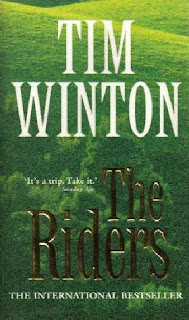The Riders
In a 2013 opinion piece ‘Misogyny lurks in Winton's world of fiction’, Nicolle Flint weighed up Tim Winton’s various representations of male and female character in his novels and concluded:
…These female characters appear stereotypical. They
''bother''. What remains most remarkable about Tim Winton's writing, in the
context of ongoing allegations of sexism and misogyny, is that the literary
left leaves the handiwork of one of our most revered cultural icons unexamined.
''Sometimes,'' as Bob Dylan once sang, ''the silence can be like thunder.''
Bob Dylan also sang ‘The Times, they are a-changing”, and
Winton has spoken directly about such accusations. (Guardian
interview with Gay Alcorn, 2018):
“I’m writing outside the enclave of the inner city, and what’s
happening in the world that I’m seeing is that women are having a harder
trajectory than men. And if there has to be a body count, does nobody seem to
notice that most of the men in my books are doing badly?
Fred Skully – protagonist of Tim Winton’s 1994 novel The Riders is one of those men who are
doing badly. As the story opens, Skully is alone in a house in ruins in wintry
Ireland, working with his hands, waiting for the arrival of his wife and daughter,
who have temporarily returned to Perth to sell the house. This is not a new
book so I can probably comment freely on the plot. She doesn’t turn up. Only
the kid arrives at the airport, and Skully goes searching: to Greece (Hydra),
to Paris, and lastly to Amsterdam. Glimpsed but never seen, Jennifer is a
ghostly malevolent spirit to counterbalance the ghostly “riders” – manly spirits
from another time, who suffer in the darkness and cold of an abandoned castle
in walking distance from Skully’s Irish home and provide him some strange comfort.
As a child Billy is a good sort – but it is true that otherwise
the female cast is sly and manipulate, and Skully gets nowhere in his
interrogation of their mutual friends in London, Paris or Hydra. Some of this might
be explained by Skully’s unfortunate visage: he may not be as aggressive but he
looks it; who would take a chance? Some of Skully’s unattractiveness to others
is more class than gender-based: he’s not as well read or as “artistic” as the
crowd of bohemians and would-be-sophisticates that have drawn Jennifer away
from her husband into the world of dreams and talents and alluring genius. As
the story progresses, Skully is
somewhat punished for his unforgivable acts – such as matching English "con-woman" Irma (drunken seduction, theft) – arrested in Amsterdam for a messy
grab at a transvestite Jennifer look-a-like in a sex shop. Ultimately he
returns to Ireland to start again. When Billie observes him with the Riders she
thinks: ‘with his wild hair and arms, his big eyes streaming in the firelight turned
up like theirs to the empty windows of the castle he was almost one of them.
Waiting, battered, disappointed’ (p.377).
It would not be hard to make a case for misogyny in reading The Riders in 2020 (shortlisted for the Booker Prize in the 90s as it was). Equally, Winton’s defense is laid out in the book: a jealous, limited man can’t catch up with his woman: his time is past – he is culturally lost, historically adrift, alone in the countryside with Pete-the-Post and Billie the kid. Away from inner city Sydney and Melbourne, far from the Utopian Greek islands and bohemian Paris, life isn’t easy for Skully – and virtue does not sit easily with desperation.
(See also Island Home, The Shepherd's Hut).




Comments
Post a Comment